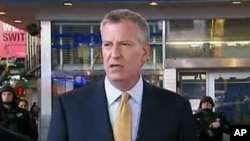In the aftermath of last month's Paris attacks, New York City officials have bolstered security and quietly stepped up outreach to Muslim residents, trying to calm fears of hate-filled retaliation and mend a relationship that has been fraught with mutual suspicion.
The city has increased its presence in Muslim neighborhoods, sending staffers to visit mosques and meet with imams and worshippers. Police officials have briefed community leaders on new counterterrorism procedures. Other city officials have urged Muslims to report any hate crimes, the number of which is sharply lower in New York in 2015 than at this time a year ago.
Mayor Bill de Blasio is to deliver a Friday evening speech at an Islamic community center, reaffirming that the city's 800,000 Muslims have the same rights as all New Yorkers while pledging protection from any hate crimes, the mayor's aides told The Associated Press.
De Blasio's speech at the Jamaica Muslim Center, or Masjid Al-Mamoor in Queens, is the most high-profile move the administration has made to calm jittery Muslims since the Nov. 13 attacks that killed at least 129 people in Paris and this week's slaying of 14 people in San Bernardino, California.
Six days after the Paris attacks, the mayor's office organized a meeting among 40 community leaders - the vast majority Muslims - and police with aims of building the trust necessary for Muslims to turn to law enforcement to report crimes. The police department has also increased security at mosques, as well as synagogues.
Hanane Dannech, a 50-year-old Muslim who immigrated from France, said she has noticed more officers watching her mosque in Brooklyn recently.
"We, really, we feel protected,'' she said, adding that what she likes about the U.S. is, "it's the first country on Earth that takes care of other religions.''
Dannech said some public officials could do a better job of pointing out that violent extremists are the minority among Muslims rather than the norm. She said there is always a chance of harassment after "big things happen'' and that "each time something happens, it gets worse.''
New York Police Department officials said there has not been an uptick in bias crimes against Muslims since the Paris attacks, though they acknowledge that some hate crimes go unreported.
The NYPD, which has 900 Muslim officers, uses its community affairs bureau to foster better relationships by staffing street festivals, providing services to accident victims and trying "to make people who don't normally talk to cops feel comfortable coming to us,'' said the head of the unit, Chief Joanne Jaffe.
On Monday, Police Commissioner William Bratton will host a conference for clergy members focusing on community involvement and the NYPD's counterterrorism threat assessment program.
"Outreach by the city to the Muslim community is critically important, especially now,'' said Donna Lieberman, executive director of the New York Civil Liberties Union. "But there must be clear distinctions between the outreach and anti-terrorism efforts. Otherwise, it will discourage Muslims from going to law enforcement and just breed further distrust.''
After the September 11 attacks, the NYPD used its intelligence division to detect terror threats by cultivating informants and conducting surveillance in Muslim communities. The practice became the subject of a series of articles by The Associated Press revealing that the intelligence division had infiltrated dozens of mosques and Muslim student groups and investigated hundreds.
Last year, amid complaints of religious and racial profiling, the NYPD disbanded a team of detectives that conducted surveillance, but it has continued its use of informants and undercover investigators to fight terror.
Meanwhile, a federal pilot program in Boston, Los Angeles and Minneapolis billed as a community-driven initiative to tackle terrorism and militant recruitment by preventing radicalization from taking root has trigged concerns that it's profiling disguised as prevention.
Some Muslims in New York say they have felt harsh stares in recent weeks.
"I don't like the idea that regular everyday Muslims are being lumped together with terrorists,'' said Maryam Mohiuddin, a hijab-wearing American artist from Bangladesh who was visiting the Al Farooq Mosque in Brooklyn. "I'd like it better if people don't look at me with suspicion. I'd rather them ask me questions.''
Following Paris Attacks, NYC Steps Up Outreach to Muslims

NEW YORK —











